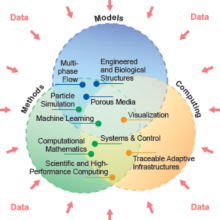The Cluster EXC 2075 sees itself as a research center with a methodological focus in a general sense. While our Principal Investigators and Participating Researchers may do simulation science from different perspectives – modeling in science and engineering, mathematically-oriented methods, and advanced computing – they all strive for new simulation methods in their research. Such a methodological research focus must align itself with methodological challenges which go beyond specific Fields of Expertise, application domains, or Visionary Examples. We call these our Focus Challenges and have identified six of them:
- FC 1: Advancing and Fusing Multi-X-Models
By advancing and fusing multi-X models, we will explore and develop new approaches in multiscale, multiphysics, and multidata modeling of coupled problems. - FC 2: Merging Physics- & Data-Based Modeling
By merging physics and data-based modeling, we will systematically integrate data from a variety of sources into physics-based simulation models, moving from high-dimensional parameter fitting via data assimilation to purely data-based models. - FC 3: Bridging Data-Poor & Data-Rich Regimes
Bridging data-poor and data-rich regimes is fundamental for understanding complex phenomena at large spatial and temporal scales if simulation results or experimental data are only available for short time intervals or small areas. - FC 4: Mastering Stochastic Models & Total Uncertainty
Mastering stochastic models and total uncertainty is vital for reliable predictions and estimates with noisy and sparse data, and it requires a deeper understanding of dependency structures and goal-oriented risk measures. - FC 5: Heterogeneous & Dynamically Changing Environments
Heterogeneous and dynamically changing environments are highly challenging for simulation and control in data-driven and interactive contexts due to real-time data availability, system variations, and user requirements. - FC 6: Making Simulation & Visualization Pervasive
Making simulation and visualization pervasive will provide universal access to simulations and their interactive visual representation from anywhere, at any time, and in varying contexts. This calls for real-time capabilities, adaption to resource limitations, and novel user interfaces.
We chose our first set of Focus Challenges specifically to tackle the enormous complexity that will result from data integration and also to prepare for how simulation will actually be done in the coming decade. Meeting our Focus Challenges will be fundamental for making progress in our Visionary Examples but will also call on our Project Networks to pursue several linked interdisciplinary research efforts.



